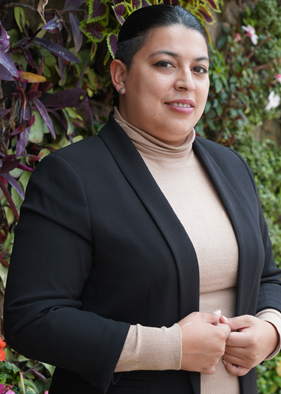January 2024, Year XVI, no. 1
Fernanda Castro Maya
Invisible? Never again
“Being part of this list is an example of how there are no limits for anyone and how you can do everything you set out to do, whether or not you have a disability, it also shows that we can and we need to talk about intellectual disability. We mustn’t be invisible.”
Telos: You fight so that people with intellectual disabilities like you can take part in political life. Can you tell us about your work as an activist?
Fernanda Castro Maya: In 2018 I joined the CONFE (Mexican Confederation of Organizations in Favor of Intellectually Challenged People) to take part in their landscaping workshop, and that same year I joined the group of self-advocates.
We self-advocates are people with intellectual disabilities who are taught to know our rights, we speak on behalf of all people with intellectual disabilities and meet in groups to become active parts of society. In 2019 I prepared to join the group Empower Us of Inclusion International and I was subsequently nominated to represent Latin America.
I have taken part in webinars and conferences on topics such as women with disabilities, participation in political and public life, work inclusion and legal competency. For CONFE I teach self-advocates about empowerment and their rights.
In October 2020 I led the online consultation “Political Participation for People with Intellectual or Psychosocial Disabilities”, organised by Inclusion International and in June 2021 I was a speaker at the “Preliminary Virtual Publication of the Guide to Political Participation of People with Psychosocial or Intellectual Disabilities” for the collateral event of the Conference of States Parties to the UN Convention of the Rights of People with Disabilities.
Then I started to get interested in topics relating to the participation of people with intellectual disabilities in political and public life. In CONFE we have the National Network of Self-advocates. There are many sub-workgroups in this network: the Network of Women with Intellectual Disabilities, For Change in Mexico, My Voice is Your Voice and the CONFE self-advocates.
Some of the initiatives of the group ‘For Change in Mexico’ include liaising with the National Election Institute and educating their staff on topics relating to intellectual disability, on what a self-advocate is, on accessibility and on the Convention on the Rights of People with Disabilities with the goal of being considered and consulted in future elections.
I also belong to a collective called ‘Deciding is My Right’, which has played a crucial role. Last year we presented the “Bill to Eliminate the Legal Guardianship System“ to the Parliament.
The Bill was approved in August 2022 and in June 2023 it was published in the Official Gazette of the Federation with the title “Reform of the New National Code of Civil and Family Procedure“. It establishes that all adults should have full legal capacity to decide what support they need in specific areas.
As you said, Mexican President Andrés Manuel López Obrador has promulgated the New National Code of Civil and Family Procedure giving full legal capacity and the right to access to supported decision-making for all people over 18 years of age. This is a fundamental victory for people with disabilities in Mexico, who are often deprived of their legal capacity. How will this reform change their lives?
This step was essential for people with intellectual disabilities. We obtained something that was our right, simply because we are people. Today we have the legal capacity to make decisions regarding our property, either alone or by requesting assistance in some situations, such as economic and healthcare assistance, in legal processes with notaries and/or lawyers and to understand complex documents, where we can obtain cognitive accessibility or a support person. This means we no longer need guardians, a person chosen by a judge without consulting us. Guardians are often people who decide for a person without taking into account what they think or need. This reform will help both families and society realise that we are equal, that we must be treated according to our age. It will show our families trust us. People with intellectual disabilities will feel more self-confident, supported and, first and foremost, included, so they can have better education, better healthcare and decent work.
In February 2022 you took part in a Mexican UN delegation that presented the report “Advancing Participation of Persons with Intellectual and Psychosocial Disabilities in Public Life,” a project carried out by the UN Development Program (UNDP). What results has this project achieved?
I was a representative for Coalición México por los Derechos de las Personas con Discapacidad (COAMEX), an umbrella organisation of five organizations that represent all types of disabilities, including CONFE, the group that represents people with intellectual disabilities.
In my speech, I argued that even people with disabilities can be elected to public office, take part in elections, be consulted, vote and many other things. I managed to make people understand that even people with intellectual disabilities can get their voices heard, participate in important spaces like that alone, perhaps with support, at different times and on different tasks, as long as we decide to do it.
The UN Expert Committee gave Mexico a series of recommendations. Here they are:
Participation in Political and Public Life (art. 29)
64. The Committee is concerned about the denial of the right to vote to people with intellectual or psychosocial disabilities – despite the case law of the Supreme Court of Justice – and about the fact that the voting procedure, facilities and materials are not accessible. Moreover, the Committee doubts that sufficient support is provided to persons with disabilities, in particular women, taking part in political and public life.
65. The Committee recommends that the State Party amend its legislation to guarantee the right to vote to all persons with disabilities. It also recommends to the Contracting State to guarantee access to voting procedures, facilities and materials in urban areas. The Committee also recommends providing the necessary support to persons with disabilities, especially women, taking part in political and public life.
In 2022 you were part of BBC 100 Women, the BBC’s list of the most influential women in the world. What did this mean for you and your battles?
Being part of this list is an example of how there are no limits for anyone and how you can do everything you set out to do, whether or not you have a disability, and it shows that we can and we need to talk about intellectual disability. We mustn’t be invisible.
It was a step forward in being taken into consideration and not getting caught up in the idea that disability is just physical. It is yet another, important, moment that has given us the opportunity to get our voices heard. Being on this list is a reflection of the support I have received, both from my family, my mother and sister, and at work, from my boss and the person assigned to support me. All of them have made it possible for me to take part in events and projects with the goal of promoting and defending the rights of people with intellectual disabilities.
I can’t deny that I felt very proud!
Marco Sonsini
Editorial
The most powerful, meaningful expression in the interview for the January issue of PRIMOPIANOSCALAc with Mexican activist, for the rights of persons with intellectual disabilities, Fernanda Castro Maya is “We mustn’t be invisible.” I asked myself: Today, do we continue to hide disability, think of it as an obstacle to try to get around, ignore or brush under the rug? Is it still invisible? In 2016 Italian President Mattarella used the same word, saying: “It is no longer acceptable for many of our citizens to become like this, invisible…” A whole piece of the country marginalised, and Fernanda forces us to open our eyes to something that scares the 'abled' world more than anything else: intellectual disability
.
Actually, before interviewing her, I was struck by the speech Fernanda gave along with other disabled activists in March 2022 at a meeting with the group leaders of the Mexican Parliament.
Her short speech, published in Human Rights Watch, ends with a high-impact slogan statement: “Nothing about us without us”. I admit I feel ashamed of my ignorance when I discovered that this is the historic motto of disabled organizations that the UN came up with in 2004 to celebrate the International Day of Persons with Disabilities, that year dedicated to the active involvement of disabled persons in planning the strategies and policies that impact their lives.
This motto acknowledges the importance of including disabled persons in the decision-making and policy-making that regards their lives and needs and making them active players in defining their present and future.
This is the work, the battle, that Fernanda began in 2018, and it is already marked by moments of great success. First and foremost, the “Reform of the New National Code of Civil and Family Procedure” that at least partially eliminates guardianship, and as Fernanda explains, “establishes that all adults should have full legal capacity to decide what support they need in specific areas.” But Fernanda doesn’t stop here. Today the battle she is waging is to guarantee their participation in the political life of the country, starting with the power to exercise their right to vote and even to run for office. These are two key points that the European Disability Forum included in its Manifesto in view of the 2024 European elections: to guarantee the right to vote and run for office in the European elections for all disabled people, regardless of the state of their legal capacity and EU country of residence.
Let’s not limit ourselves to just looking on and hoping that something happens, let’s try to do something. Could we make this our resolution for 2024?
This issue will kick off the new graphics of PRIMOPIANOSCALAc's 2024 covers. We were inspired by the works of Romano Gazzera, a Piedmontese painter famous for his “giant”, “speaking”, “flying” flowers that, along with other iconic themes linked to historical and collective memory, have characterised and distinguished him as the leader of the Italian Neo-floral school. Our covers won’t be only static, they’ll even have a more dynamic version. Just wait for us to launch it on social media. The choice for Fernanda was obvious: a dahlia, originally from Mexico and its national flower since 1963. The Aztecs grew it not just for decoration, but for many other uses. They ate it as a tuber, they used its stems to create small water tubes and used the juice from its roots as medicine.
Mariella Palazzolo

Fernanda Castro Maya is a Mexican activist who fights for the rights of persons with intellectual disabilities, and especially for their participation in political life. She is a member of the Mexican Confederation of Organizations in Favor of Intellectually Challenged People (CONFE) and since 2020 has represented Latin America in Empower Us the global network program of Inclusion International supporting the inclusion of persons with intellectual disabilities and their education.
In 2022 Fernanda was part of the BBC’s list of the most influential women in the world BBC 100 Women. She loves sports and boxes. She already knows what she is going to do in the future: “I’ll keep working for equal opportunities for people with intellectual disabilities.” What does she desire? To have her own home and be independent.
Fernanda was born in Mexico City and is 31 years old.
Marco Sonsini







SocialTelos